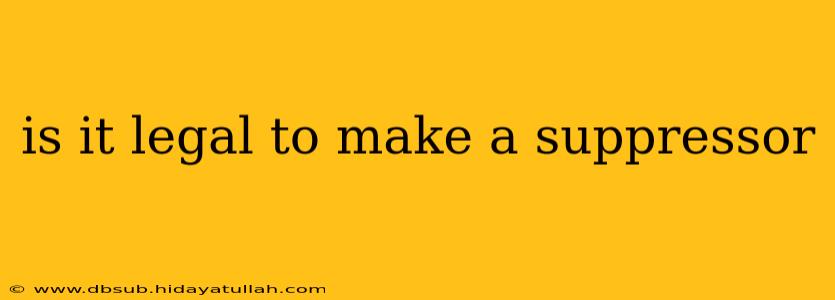The legality of making a suppressor (also known as a silencer) is a complex issue governed by the National Firearms Act (NFA) of 1934, as amended. The short answer is no, you cannot legally make a suppressor without significant legal hurdles and prior authorization. This guide will break down the intricacies of the law and the steps involved.
Understanding the National Firearms Act (NFA)
The NFA regulates the manufacture, transfer, and possession of certain firearms and firearm accessories, including suppressors. These items are considered "NFA items" and are subject to strict regulations designed to control their distribution and use. Key aspects relevant to suppressor manufacturing include:
-
Registration: Before you can legally manufacture a suppressor, you must be registered with the Bureau of Alcohol, Tobacco, Firearms and Explosives (ATF) as a manufacturer. This involves a rigorous application process and background check. Simply possessing the manufacturing tools or possessing an unregistered suppressor is illegal.
-
Tax Stamp: Each suppressor manufactured must be accompanied by a tax stamp. This tax, currently $200 per item, signifies the government's authorization for its manufacture and possession. The process for obtaining these stamps is lengthy and requires extensive paperwork.
-
Serial Numbers: Every suppressor must be uniquely serialized to comply with ATF regulations. This allows for accurate tracking and monitoring of the item throughout its lifecycle.
-
Manufacturing Standards: The ATF sets specific standards for suppressor construction and design. These standards ensure that the suppressors are manufactured safely and effectively. Deviating from these standards can lead to legal repercussions.
The Process of Legally Manufacturing a Suppressor
Even with the appropriate registrations and licensing, the process of legally manufacturing a suppressor is highly regulated and challenging:
-
ATF Registration as a Manufacturer: This is the first and most critical step. It involves completing a comprehensive application, undergoing a thorough background check, and demonstrating compliance with all ATF regulations.
-
Secure Manufacturing Facility: The ATF will likely inspect your manufacturing facility to ensure it meets their safety and security standards. This involves securing proper storage facilities for components and finished products.
-
Design and Engineering: Suppressor designs must comply with ATF standards, and any new designs will require approval. This requires precision engineering and adherence to strict specifications.
-
Tax Stamp Application: For each suppressor manufactured, a separate tax stamp application must be submitted and approved by the ATF before the suppressor can be legally sold or possessed.
-
Record Keeping: Meticulous record-keeping is crucial. Detailed records must be kept of all manufacturing processes, materials used, and the final disposition of each suppressor.
Penalties for Illegal Manufacturing
The penalties for manufacturing a suppressor illegally are severe and can include:
-
Significant Fines: Fines can reach tens of thousands of dollars.
-
Imprisonment: Jail time is a possibility, with sentences varying depending on the severity of the offense.
-
Forfeiture of Equipment: The ATF can seize all equipment used in the illegal manufacturing process.
Alternatives to Homemade Suppressors
If you are interested in using a suppressor, purchasing one from a licensed manufacturer and dealer is the only legal and safe alternative. This ensures the suppressor is legally registered, complies with safety standards, and eliminates the risk of legal penalties.
Disclaimer:
This information is for educational purposes only and should not be considered legal advice. Always consult with a legal professional specializing in firearms laws before undertaking any actions related to the manufacture or possession of NFA items. The regulations are complex and subject to change. This guide does not constitute a complete and exhaustive explanation of all ATF regulations.
